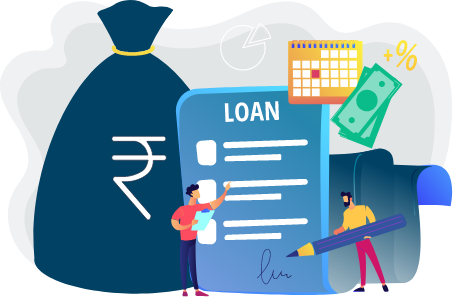A personal loan eligibility calculator is a tool that can help you determine whether you can get a loan and the amount you can qualify for. It evaluates your financial situation by factoring in your net monthly income and monthly expenses.
The estimated loan amount is based on your repayment capacity, ensuring that you can manage repayments without any financial strain. By analysing your income and expenses, this tool facilitates timely repayments, promoting responsible borrowing.
The eligibility criteria for a personal loan may vary significantly among lenders as each institution has its own approach to assessing your financial health and repayment capacity. These criteria are designed to help lenders minimise risk while ensuring you can comfortably manage the loan repayments.
When applying for a personal loan, you will need to meet specific requirements related to your credit score, income, employment status, age, and existing financial obligations.
To calculate your personal loan eligibility, you need to provide information about your employment type, net income, and details of your existing financial obligations. These details calculate your debt-to-income (DTI) ratio. This represents the monthly expenses from your net earnings, which indicate your debt payments.
Your repayment capability is based on this DTI ratio. If your current finances are manageable, you may be eligible for a higher loan amount. If your liabilities are bigger, your loan eligibility can diminish.

When applying for a personal loan on Bajaj Markets, you need to meet certain eligibility criteria. Here are the general criteria that all the partnered lenders require:
You must be an Indian citizen
Your age must be above 18 years old
You must have a CIBIL score of 600 or above
You can either be salaried or self-employed
You must have a minimum monthly income of ₹10,000
You must have a minimum of 1 year of work experience if you are salaried
While there are common personal loan eligibility criteria requirements such as nationality and employment, differences often arise in terms of CIBIL score, income, and age requirements. Below is a detailed overview of the typical eligibility criteria set by various lenders available on Bajaj Markets:
Bajaj Finance Limited
You must be a citizen of India
You must be a salaried individual, specifically an employee of private, public, or reputable MNC
Your age must be between 21-65 years
You must have a minimum monthly salary of ₹25,000
Your CIBIL score must be 685 and above
CASHe
You must be a resident of India and a salaried individual
Your age must be between 21-40 years
You must have a good credit score
You must have a minimum monthly salary of ₹18,000
Federal Bank
Your age must be between 21-55 years
Your CIBIL score must be 730 and above
Your eligibility is based on the ‘Federal Bank credit policy’
Fibe
You must be a resident of India
You must be a salaried individual
You must have a good credit score
Your age must be between 21-55 years
You must have a minimum monthly salary of ₹18,000 if you are a resident of a metro city
You must have a minimum monthly salary of ₹15,000 if you are a resident of a non-metro city
Finnable
You must be a salaried individual
You must have a work experience of at least 6 months with 3 months experience with your current employer
Your age must be between 21-60 years
You must have a minimum monthly salary of ₹20,000 if you are a resident of a Tier 1 city
You must have a minimum monthly salary of ₹15,000 if you are a resident of Tier 2 city
IIFL Finance
You must be a resident of India
Your age must be between 19-60 years
You must have a minimum monthly salary of ₹15,000 if you are a salaried employee
You must have a bank balance of at least ₹8,000 if you are self-employed
Your CIBIL score must be 700 and above
InCred
You must be a salaried individual
You must be a resident of India
Your age must be above 21 years
You must have a minimum monthly salary of ₹15,000 and a maximum of ₹50,000
Kissht
You must be either a salaried or a self-employed individual
Your age must be between 24-60 years
You must have a minimum monthly salary of ₹15,000
Kotak Mahindra Bank
Your age must be between 21-60 years
You must be a salaried individual, specifically an employee of private, public, or reputable MNC
If you are a Kotak Bank salary account holder, your monthly income must be a minimum of ₹25,000
If you are a salary account holder of another bank or NBFC, your monthly income must be a minimum of ₹30,000
If you are a Kotak Mahindra Bank employee, your monthly income must be a minimum of ₹30,000
You must have a graduate degree
You must have a work experience of at least 1 year
You must be a resident of the current city for at least 1 year
You must have a CIBIL score of 750 or more
KreditBee
You must be a citizen of India
Your Aadhar card must be linked to your mobile number
Your age must be above 21 years
You must have a minimum monthly salary of ₹10,000
L&T Finance
You must be a citizen of India with valid ID proof
Your age must be between 23-55 years
You can either be self-employed or a salaried individual
MoneyTap
Your age must be between 23-58 years
You must be salaried and have a minimum monthly in-hand salary of ₹20,000
Your salary must be credited to your bank account, as cash salary is not accepted
Moneyview
Your age must be between 21-57 years
You must be either a salaried or self-employed individual
Your salary must be credited to your bank account
You must have a minimum monthly salary of ₹13,500
You must have a minimum bank balance of ₹10,000
mPokket
You must be a citizen of India
Your age must be above 18 years
You must have a minimum monthly salary of ₹9,000
Your salary must be credited to your bank account, as cash salary is not accepted
Muthoot Finance
You must be a salaried employee and work in a Public Sector Unit (PSU) or any reputed company
Your age must be between 23-60 years
You must have a minimum monthly salary of ₹20,000-₹30,000 if you are a resident of a metro city
You must have a minimum monthly salary of ₹15,000-₹25,000 if you are a resident of a non-metro city
Olyv
You must be either a salaried or self-employed individual
You must have a good CIBIL score
Your age must be between 21-50 years
You must have a minimum monthly salary of ₹20,000 if you are a salaried employee
You must have a bank balance of at least ₹25,000 if you are self-employed
PaySense Partners
You must be a citizen of India
You must be either a salaried or self-employed individual
Your age must be between 21-60 years
You must have a minimum monthly salary of ₹20,001 if you are a resident of a metro city
You must have a minimum monthly salary of ₹18,001 if you are a resident of a non-metro city
Your CIBIL score must be 700 or above
Privo
Your age must be between 21-57 years
You must have a minimum monthly salary of ₹20,000
Your CIBIL score must be 700 or above
SMFG India Credit
Your age must be between 21-60 years
You must be a salaried employee in a private limited or public sector company
You must have a work experience of at least 1 year with 6 months experience with your current employer if you are salaried
Minimum monthly salary of ₹25,000 if you are a resident of Mumbai or Delhi and ₹20,000 if you are a resident of another city
Your CIBIL score must be 750 and above
Upwards
Your age must be above 21 years
You must have a work experience of at least 2-3 years
You must be a resident of India
You must be salaried and have a minimum monthly salary of ₹20,000
YES Bank
Your age must be between 21-60 years
You must have a minimum monthly salary of ₹20,000 if you are a resident of a Tier-1 city
You must have a minimum monthly salary of ₹15,000 if you are a resident of Tier-2 or Tier-3 city
You must be a salaried employee in a private limited company or the public sector
Your CIBIL score must be 700 or above
Zype
Your age must be above 18 years
You must be a salaried individual
You must have a valid Aadhar and PAN Card
Criteria for eligibility are determined by factors such as age, employment status, and CIBIL score. As personal loans are unsecured, a high credit score is required by certain lenders. Some loan offers are exclusive to salaried individuals, while other lenders stipulate a minimum age of 25.
Here are some key factors that affect your personal loan eligibility.
Factors |
Requirements |
Age |
Lenders typically prefer applicants aged between 18-21 years and under 60-65 years, though no specific age is set by the RBI for personal loans. |
Employment Status |
You can be self-employed or salaried. Many lenders offer personal loans only to salaried individuals due to their more stable income compared to self-employed applicants. |
Monthly Income |
Your monthly income, whether from salary or self-employment, helps lenders assess your ability to repay the loan. |
CIBIL Score |
A higher CIBIL score reflects responsible borrowing and financial management. Late payments can lower your score, making it harder to secure flexible loan terms. |
Debt-to-Income (DTI) Ratio |
The DTI ratio compares your total expenses to monthly income, indicating whether you can manage repayments and balance your debts with income. |
Work Experience |
Some lenders require at least one year of work experience to ensure a stable income source. |
Improving factors like employment, CIBIL score, income, and DTI ratio can enhance your personal loan eligibility.
Aspects |
Improvement Suggestions |
CIBIL Score |
Improve your credit score by making timely repayments, reducing unnecessary expenses, and avoiding new debts. |
Income |
Showcase a higher income by including bonuses, incentives, and investment earnings to demonstrate better repayment capacity. |
Debt-to-Income (DTI) Ratio |
Lower your debt-to-income ratio by reducing expenses, paying off existing debts, and avoiding additional loans. |
Longer Tenure |
Opt for a longer repayment tenure to reduce EMI amounts and meet eligibility requirements. |
Loan Applications |
Avoid applying for multiple loans in a short time to prevent being perceived as credit-hungry and to increase loan approval chances. |
Reference of all T&C necessarily refers to the terms of the Partners as regards to pre-approved offers and loan processing time amongst other conditions.
Frequently Asked Questions
What is a personal loan eligibility calculator?
The personal eligibility calculator is a digital tool that helps you estimate the loan amount you are eligible to borrow. This calculation is based on factors like your employment type, income, and existing liabilities.
How can I check if I'm eligible for a personal loan?
To check your personal loan eligibility, you can use the personal loan eligibility calculator online. Alternatively, you can refer to the eligibility details available on the lender’s website or app.
Do my ongoing loans affect my personal loan eligibility?
Your ongoing loans influence your personal loan eligibility as they affect your CIBIL score and debt-to-income ratio. These factors determine your repayment capacity and borrowing behaviour, which lenders use to assess if you are eligible for a personal loan.
How much personal loan am I eligible for based on my salary?
You can estimate your personal loan eligibility by using online loan eligibility calculators. These tools take your salary into account to give an estimate of the loan amount you may qualify for.
How does the applicant's age affect the personal loan eligibility?
Age plays a role in personal loan eligibility, as most lenders require applicants to be between 18 and 65 years old. This age range is considered when assessing repayment capability based on employment status and income.
How does the applicant's income affect the personal loan eligibility?
Income affects personal loan eligibility as it reflects your ability to repay. A stable income source and work experience are key factors that determine whether you can afford a personal loan.
Are the eligibility criteria for salaried and self-employed different?
Eligibility criteria can differ for salaried and self-employed individuals. Some lenders have distinct requirements for each group based on their income stability and financial profile.
How can I improve my personal loan eligibility and get a higher amount?
To enhance your personal loan eligibility, consider the following tips:
Maintain a good CIBIL score of 700 or more
Maintain a lower DTI ratio
Highlight your additional sources of income
Avoid making multiple loan applications
Why is determining my eligibility important for a personal loan?
Determining your eligibility when applying for a personal loan helps you identify the amount you can get. This will help you plan your finances wisely and understand your monetary situation better.
Will I have to pay a fee to check my personal loan eligibility?
No, most of the lenders provide this facility without charging any fee.
What are the benefits of using a personal loan eligibility calculator?
Using a loan eligibility calculator for a personal loan helps with the quick and accurate assessment of loan eligibility. This enables individuals to plan and apply for loans that suit their financial capabilities.
How does my current debt status have any impact on my personal loan eligibility?
Lenders generally assess the borrower's debt-to-income (DTI) ratio to determine their ability to manage additional debt repayments. Thus, a lower DTI ratio may improve your eligibility.







